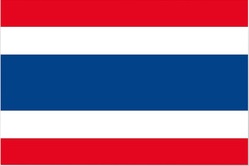Thailand: expats feel the pain of a pandemic
As the number of domestic coronavirus cases continues to rise, foreigners living in Thailand are among those who have had to adapt the most as visa requirements and visits to immigration have now become fraught with additional risks as well as the usual inconvenience.
Starting on Friday night, a six-hour curfew banned people nationwide from leaving their home between 10pm and 4am, except medical staff, patients and those working for transport or delivery services. Neon-lit Bangkok has turned into a ghost town as city residents scramble to get home ahead of the deadline.
However, the impact of anti-coronavirus measures was already being felt. J Geoffrey Walsh, a retired British expat in Bangkok, said the partial lockdown of the capital [from March 22-April 12] has changed his life.
« I live in an apartment on Wireless Road. The area is much quieter than it was. I am going out twice a week to do grocery shopping at a supermarket at Central Chidlom. However, I agreed to go into partial lockdown for my own safety because I belong to a risk group [the elderly]. Fortunately, my partner helps me with food, » he told the Bangkok Post.
Mr Walsh said he has been spending his time reading books and following the news about Covid-19. He expressed concern about the government’s communication with the public and its handling of visa requirements for foreigners living in the country.
Long term visa in Thailand
« I have to submit 90-day reports and also renew my retirement visa at the end of April every year, but if I go to the Immigration Bureau, I won’t be able to observe one-metre social distancing, » he said.
Following the coronavirus outbreak, the Immigration Bureau has recently reminded foreigners that they can notify their residence and stay over 90 days by registered mail or via online services. However, many have complained the online system is unreliable. These methods of application are also not available for long-term visa extensions.
Michael Sobelman, a retired American expat in Khon Kaen, said he supports the government’s move to enforce a curfew to contain the spread of Covid-19.
« Keeping people at arm’s length was nearly impossible. You know, I saw a lot of people not wearing face masks at bars and restaurants. They had no regard for the law. I am happy to see these outlets closed for now, » he said.
However, Mr Sobelman said the coronavirus outbreak is likely to cause him problems when he has to renew his retirement visa which is due to expire in August.
« I normally fly back to extend my visa with the Royal Thai Consulate General in New York, but I can’t do it this year because the situation is critical.
« However, I can’t open a bank account in Thailand either because banks are closed for now. When I contacted the Immigration Bureau, nobody answered the phone, » he said.
 The pandemic has chased away tourists
The pandemic has chased away tourists
Meanwhile, Peter Braunwarth, is a German bookshop owner in Chiang Rai. He said the pandemic has chased away tourists and brought his business to a halt.
« I have sold only one book over the past five days. My neighbourhood has gone silent because tourists are not allowed to enter the country and locals are staying at home. Many shops have closed and restaurants offer takeaway only.
»My bookshop remains open and maintains social-distancing, but nobody is coming, » he said.
Li Min, 49, is a Thailand-based reporter from the China Media Group. She said she is having to rely on phone interviews and goes out to shop only as necessary.
« It’s sad, [Thailand is a] tourism country and it’s quiet now even for domestic tourists, » she said.
« However, it’s quiet at night, there’s no noise from motorcycles or tuk-tuks so I sleep soundly these days, » she said giggling.
Ms Li said she sees no point in the requirement to report her address every 90 days as it is inconvenient. And she rarely travels anywhere else during the year. She adds the online reporting system has not worked when she has tried to use it.
Source: bangkokpost.com

